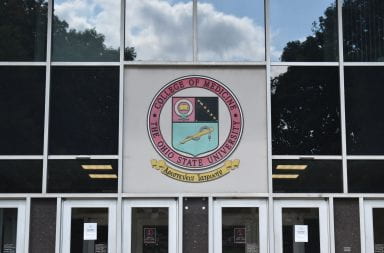
CitizenAID Public Safety Drop Kits will be provided to 15 counties in central Ohio beginning in December. Credit: Courtesy of Franklin County Emergency Management & Homeland Security
After 58 people were killed and hundreds were injured in the 2017 Las Vegas music festival shooting, attendees and bystanders rushed to help one another, using items such as clothing to help the wounded.
Now, safety kits will be provided in central Ohio — and at Ohio State — in order for citizens to be able to help first responders in an emergency situation.
CitizenAID Public Safety Drop Kits will distribute 6,000 kits among 15 counties in central Ohio starting in December, Jeffrey Young, director of Franklin County Emergency Management and Homeland Security, said. University Police is one of the divisions that will receive kits, Dan Hedman, university spokesperson, said.
“Our police train countless hours to be prepared for emergency situations. We are supportive of the Franklin County CitizenAID safety kit initiative and any additional resources to enhance overall safety,” Hedman said.
Young said the goal with the safety kits is to treat as many people as possible and increase survivability.
“On a more basic level, our hope is it empowers people to be prepared to take action, and this encourages people to be proactive and understand what they can do to positively impact the outcome of a tragedy or event,” Young said.
The motivation behind Franklin County’s interest in the kits came from the 2017 Las Vegas massacre, Young said.
“They used a lot of makeshift items to provide care, so that is what kind of got us started to think about this,” Young said.
On Oct. 1., 2017, Stephen Paddock opened fire on concertgoers at a country music festival from his hotel room at the Mandalay Bay. Fifty-eight people were killed and more than 500 were injured, according to news reports. In the wake of so many injuries, civilians came to each other’s aid.
Kits will be given out to first responders — including police, fire and EMS — and will be distributed to each county based on population and volume of first responders in those counties, Young said. The first responders will carry the kits with them in the event of an emergency and have the option to give them to people when necessary.
Young said one kit provides aid for one patient.
The kits include six products: a tourniquet, pressure dressings, Z-fold gauze, scissors and instructions on how to use the products, Bob Otter, founder and CEO of CitizenAID, said.
Otter said his background as a firefighter and in the medical equipment industry helped him realize that the first responder’s job is to stop the threat before attending to the wounded.
“The first arriving police officers at the scene, who sometimes are there within a minute, go in and literally step over the injured people in order to do their job and neutralize the threat,” Otter said. “So why don’t we give them these tools at the police cruiser level, so they can have the public start to treat themselves.”
The instructions provided in the kits make the products included easy for civilians to use, Young said.
“This allows them to drop a bag of kits with people or in a group of people so they can either begin self-treatment, or somebody in that group can start treatment,” Young said. “This allows a high volume of medical care to begin, allowing trained paramedics, fire and EMS units to focus on the most severely injured and critical patients.”
Otter said CitizenAID is based on a military program called Combat Lifesaver, which taught young soldiers in Iraq and Afghanistan simple steps to help them keep their fellow soldiers alive. The program lowered the preventable death rate by 25 percent.
The department decided to purchase 1,000 bags that contain six kits each, at $330 per bag or $45 per patient, Young said. The funding for the kits is from a state Homeland Security grant.
Otter said CitizenAID offers $14 online safety classes that teach safety, preparedness and medical treatment to the general public. For every class purchased and completed, CitizenAID matches it and teaches a teacher for free.
In addition to the class, it also has a safety guide app it hopes to have as a factory setting on phones one day, Otter said.


